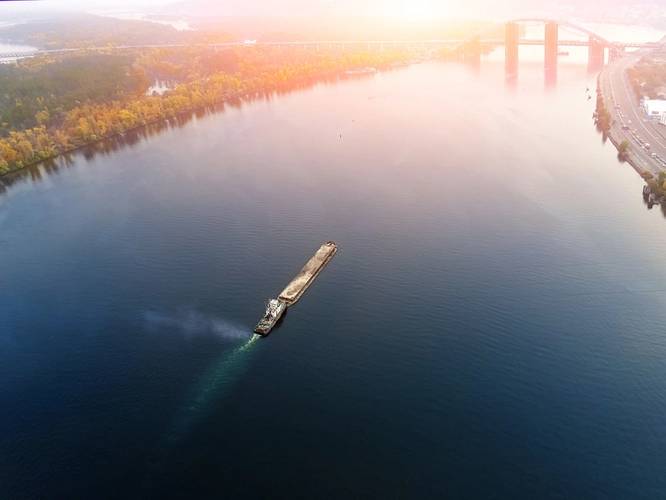Maritime Risk Symposium 2022: The Importance of Inland Systems to the MTS
The 2022 Maritime Risk Symposium (MRS) is scheduled to be held Nov. 15-17, 2022, hosted by Argonne National Laboratory at the Argonne campus in Lemont, Illinois. MRS is an annual international event focused on risks involving the global maritime transportation system (MTS). For the MRS, the U.S. Coast Guard partners with the sponsor, the Transportation Research Board of the National Academies of Science, Engineering, and Medicine, and the hosting agency. MRS began in 2011 and has grown in size, scope and interest.
The MRS event will be followed by the U.S. Coast Guard’s Evergreen strategic planning event on Nov. 17. Evergreen is the Coast Guard’s process to look at strategic issues into the future. This year’s event will be the third time Evergreen has been held in conjunction with MRS and will look at river system risk and disruptions.
MRS 2022 Theme
The theme of MRS 2022 is “The Importance of Inland Systems to the MTS.” The global network of navigable inland waterway systems is significant as noted in Figure 2, which shows the top 10 navigable systems in the world.
The United States has more than 25,000 miles of navigable waters, which can carry around 630 million tons of cargo annually. Barges carry the bulk of the commodities on the inland river networks while freighters carry the commodities on the Great Lakes and Saint Lawrence Seaway. About 60 percent of U.S. farm exports travel through inland waterways. Disruptions to this collective maritime system would have serious impacts on the nation’s economy and its logistics system.
In Europe, the dependence on river systems is even more pronounced with disruptions causing major ramifications. In July, headlines in the international media underscored that decreasing river depths have wreaked havoc with goods and services movement – especially fuel along rivers like Germany’s Rhine. One example of this disruption: Coal plants in Germany are not getting their shipments because the Rhine River, which is over 800 miles long, is at its lowest point since 2007. The commerce depending on this maritime “super highway” is significant.
Another classic example of the significant economic impacts a disruptions of the river systems within the MTS was demonstrated when the container ship Evergreen blocked the Suez Canal for six days in March 2022. The BBC had estimated that economic losses from the shipping delays triggered by the blockage were on the order of $6.7 million per minute.
Top Ten Largest Navigable Inland Waterway Systems.
The 2022 Maritime Risk Symposium will provide a strategic look at multiple issues of interest to those in industry and government, internationally and for future research by think tanks and academia. MRS 2022 is structured around a series of panels that will address issues critical to the MTS. There will also be several keynote speakers, which include both Coast Guard and Army Corps of Engineers senior leaders. The panels and their leadership include:
Mission Assurance for the MTS in a Changing World – Moderator, Rear Adm. Tom Atkin, USCG retired
Mission Assurance refers to the process to protect or ensure the continued function and resilience of capabilities and assets – including personnel, equipment, facilities, networks, information and information systems, infrastructure and supply chains – critical to the performance of the Maritime Transportation System in any operating environment or condition. While there have been significant efforts to improve the resilience of individual systems in the maritime domain, especially electricity, there needs to be a more holistic approach to the entire MTS and the interconnectivity of the different domains (maritime, cyber, space, air and land).
Long-term Resilience Planning and Climate Adaptation for Maritime Transportation Infrastructure – Moderator, Dr. Henry Willis, RAND Corporation
Maritime transportation infrastructure is threatened by numerous and increasing effects of climate change. These increasing risks are evident in flooding of inland and coastal infrastructure and changes in water availability threatening navigability of waterways and infrastructure operations. Climate adaptation has risen on the list of challenges that planning must account for to ensure the effectiveness, efficiency and resilience of maritime transportation infrastructure now and in the future.
This panel brings together perspectives from the Coast Guard, its partners in the maritime transportation sector and insights from the research community to discuss what the community knows about the risks from climate change, how the sector is incorporating adaptation into long-term resilience planning, and what knowledge is needed to inform those efforts.
Supply Chain Challenges to the MTS – Moderator, Ms. Allison Bennett-Irion, Argonne National Laboratory
This panel will explore how decarbonization goals and associated energy trends impact supply chains, with a particular focus on inland waterways. Focus areas will include the decline of coal, rise of alternative vessel fuels and critical material exploration. Experts will share their experiences and discuss trends and challenges.
Training the Next Generation of Maritime Cyber Warriors – Moderator, Mr. Scott Blough, Mandiant
The cyber threats to the maritime environment are increasing in scope and magnitude while the talent stream struggles to keep up. This panel will address some of the innovative ways in which the next generation of cyber warriors are being prepared by expanding experiential learning through directed practical experience. Included with the panel will be an overview of a Department of Energy program called CyberForce, an annual, weekend long competition between teams of college students who play the role of attackers and defenders of a simulated energy infrastructure. In addition, the panel will delve into successful programs, both past and present, to identify common key concepts to inform the future training of the Maritime Cyber Warriors.
Keeping the Inland Waterways Open – Balancing Maintenance and Operational Requirements against Increasing Threats – Moderator, Col. James Allen, USAR, Army Corps of Engineers Construction Engineering Research Laboratory
The critical role that inland waterway systems play in the global supply chain system means that any closure or reduction of movement can generate impacts that can ripple through the world. This panel will address the delicate balancing act that is played out daily to keep the MTS operating while also providing the required maintenance, upgrades and new construction required to keep the MTS current and relevant.
COVID 19 Lessons Learned and Planning for the Next Black Swan Event – Moderator, Capt. David Moskoff
COVID 19 inflicted massive health and economic impacts to the world. While the pandemic is not over, a switch has occurred in the response efforts from locking down and trying to avoid infection at all costs to accepting it as a background condition to be mitigated. The maritime communities learned how to deal with the virus in order to keep the MTS operating. COVID will also not be the last Black Swan event to impact the world and this panel will examine what the COVID experience has taught us and how we can learn from it to prepare for the next Black Swan event.
Student Poster Competition
MRS 2022 will again include a student poster competition in which undergraduate and graduate students can submit posters on research topics addressing issues of interest to the maritime community. This provides students the opportunity to contribute to the field of maritime risk, gain professional recognition and build a network of like-minded students, colleagues and mentors.
Posters will depict research done by the student or students, generally with the guidance of a faculty adviser. The research could include fieldwork, interviews, literature reviews, an exploration of emerging technology, policy analysis or other methods of examining risk factors in the maritime domain.
Students, both undergraduate and graduate/doctoral, are invited to submit research presentations mapped to the panel tracks, but also will consider research submissions addressing other areas in the maritime domain. The MRS committee encourages creativity and will consider all applications that address maritime risk topics.
The poster competition is open to students nationally, and students will be able to present their posters either in person or virtually. Senior members of the maritime and academic communities will judge the posters.
- Register for MRS 2022 here: https://www.maritimerisksymposium.org
MRS 2022 Offering Register Now-Pay Later Option
With the annual uncertainty of when a Federal fiscal year budget will be approved, MRS 2022 is offering a “Register Now-Pay Later” option. This option will enable participants to reserve a slot at the meeting while the FY 23 budget approval cycle is completed. This option is available for both in-person and virtual registrants. Please go to the MRS 2022 website (https://www.maritimerisksymposium.org/) to register for the Symposium, either in-person or virtually.



















